Jennifer Robson Never Set Out to Write a Novel About Queen Elizabeth's Coronation
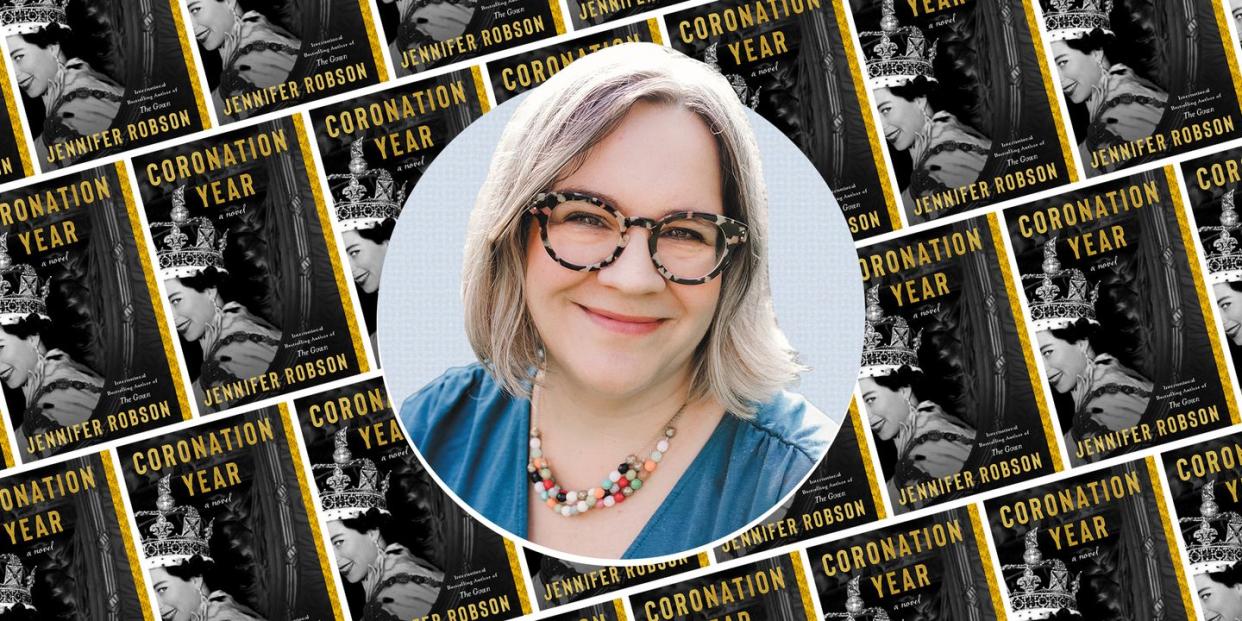
"Hearst Magazines and Yahoo may earn commission or revenue on some items through these links."
Jennifer Robson's novels have typically come out in January, but she's thankful her newest, Coronation Year, didn't drop at the start of 2023. "I would have been going head to head with Prince Harry!" she jokes.
The publication date for her historical fiction novel, Coronation Year, out today, was confirmed long before the death of Queen Elizabeth II and the coronation of King Charles III. In fact, she had thought the novel would be timed to the 70th anniversary of Elizabeth II's coronation in June—and while it will still commemorate that occasion, the relevance of her story takes on a whole new layer this spring.
Coronation Year is set in 1953 at the fictional Blue Lion hotel. The Blue Lion's owner, Edie Howard, learns her hotel will be along the coronation procession of Queen Elizabeth, and hopes that it will help save her failing business. Alternating between Edie's perspective, and that of two of her tenants—Holocaust survivor and photographer Stella, and Scottish-Indian veteran and painter James—as they gear up for the monumental day, the novel is a look at Londoners living through history.
Ahead of the publication, Robson, a historian turned novelist, chatted with T&C over Zoom about all things coronations.
What inspired you to set a novel during the coronation?
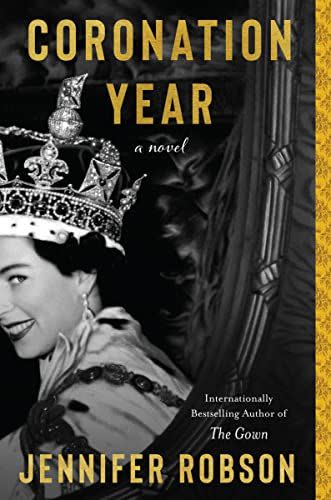
Coronation Year: A Novel
$19.99
amazon.com
It's not a sequel to my book The Gown, I had this discursion over to Italy in World War II for my previous book, Our Darkest Night. Having done that, I felt ready to return to England. I always have this ongoing question of what is it like in the aftermath of war? In The Gown, I was really looking at very, very close to the end of the war—it was a period of such austerity and people were really, really struggling.
By the time 1953 rolls around and you have this coronation year, the prevailing mood was a much more positive, optimistic, hopeful one. I wanted to capture that sense of, oh, at last, we can see a future for this country, for ourselves, for the world, that really feels like it's full of possibilities. That didn't really happen until you get into the early 50s and the period of austerity, the rationing, the controls, that starts to lift.
As North Americans—Canadians, Americans—we didn't experience that extended postwar period of difficulties the way people in Britain and Europe did. It just took so much longer for them to recover. I always find that aftermath, the period of what happens after a war like that, is almost as fascinating as what happens during the war. It's ground that's been less well covered.
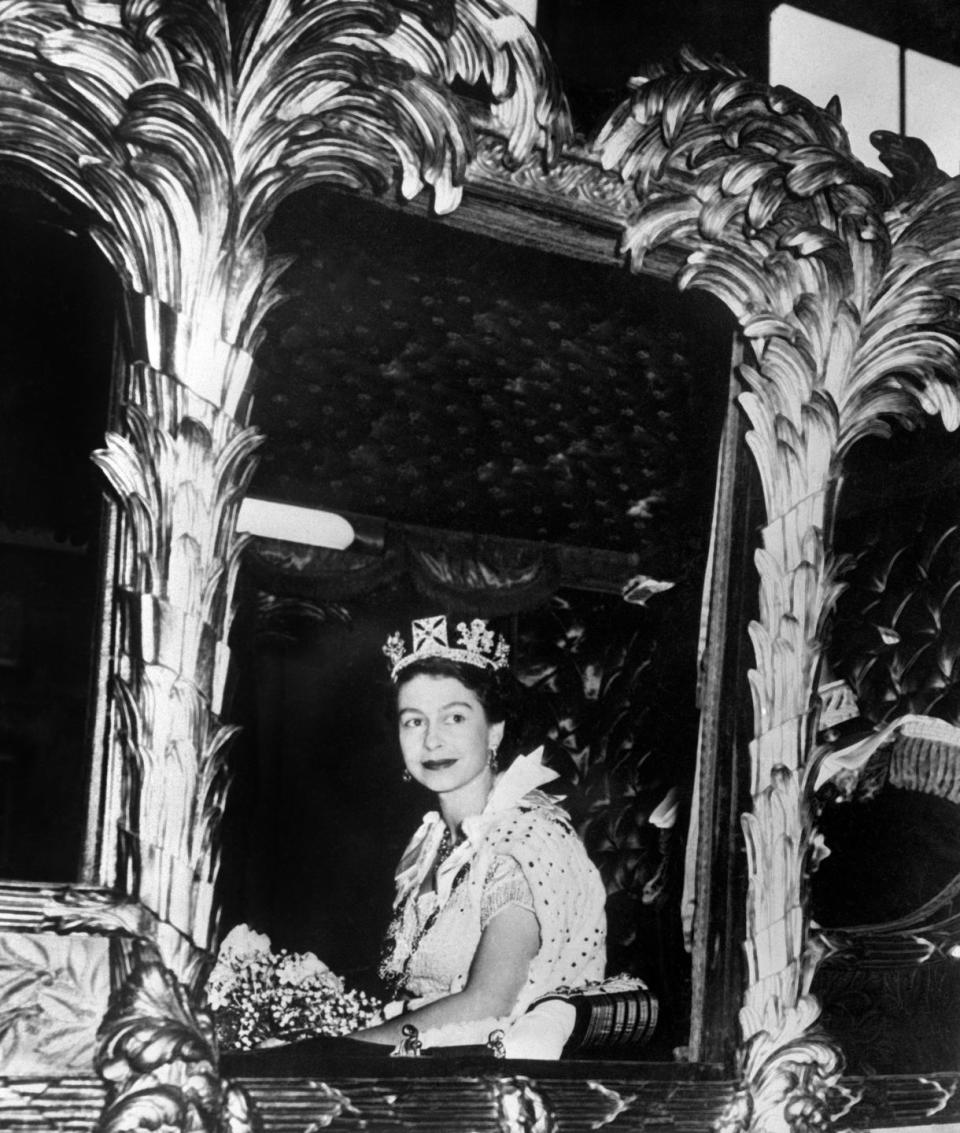
I had this image one day of what would it be like to stand in the streets and watch Queen Elizabeth go by in the Gold State coach, looking so beautiful, almost unearthly. What would it be like to see her on that great day, and know that in some way you're a part of it? Could that moment of connection—could it have a greater role in your life story? Could the coronation, could the procession going by, have an effect on you personally, above and beyond having a story to tell your grandchildren? That slowly turned into living on the parade route and then, and then the hotel—of course, hotels are like catnip for writers. I mean what's not interesting about a hotel? Gradually, I found the characters that way.
So when you're thinking about the postwar period, why did you zoom into the coronation specifically?
It's such a fascinating history. I mean, 1,000 years of history! How many things in this world today do we have that have that level of depth—in terms of being able to go back century after century. This ceremony that will take place in May will be recognizable to the people who were present for the coronation of William the Conqueror in 1066, if not entirely understandable. That's just extraordinary, that we can have something like this that endures—it's the only ceremony of its kind that continues to this day. The European monarchies don't have coronations anymore, they have investitures. There's very few places in the world where such a thing still takes place. To me, that's part of the fascination.
I think people will be surprised by the seriousness of the ceremony, by the solemnity of it, and how steeped in history it is. The sight of the King, dressed in these robes, some of which are really quite old, dating to the later Georgian kings, wearing this crown [St. Edward's Crown] that dates to the 1660s. The original regalia was destroyed in the English Civil War; if not for that he would be wearing a crown that would be conservatively 1000 years old. It gives me kind of the shivers.
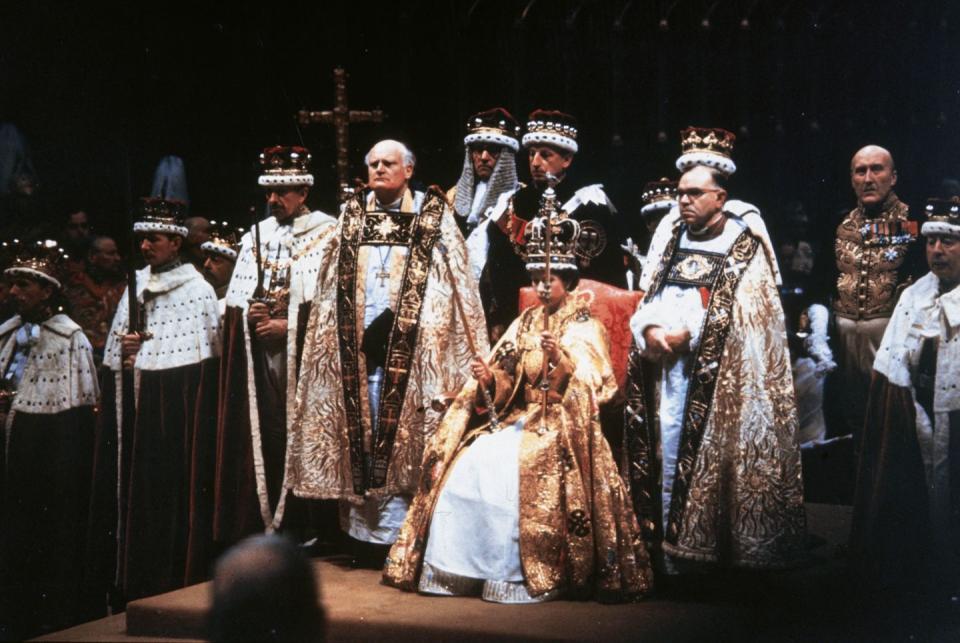
But in terms of the coronation itself, I never set out to write a book that was about the coronation. I'm using it as a backdrop to tell the stories of ordinary people.
When you're writing historical fiction, how do you balance getting the facts right with telling a good story?
It's tricky; the history nerd in me is constantly at war with the novelist. One thing that I found really crucial when I'm writing is point of view; I love using people who are outsiders as characters, like somebody who's new to a place, because then they can look around and go, 'Oh, well, this is interesting. This is what my eye is noticing.' That's one way to clamp down on the info dump tendencies.
I've now become accustomed to knowing that maybe 5% of what I uncover in my research is gonna make it into the page of the pages of my books. But I still feel that it's there, somehow. As if the book is an iceberg and what you see and read is this little bit on top here, but undergirding is the knowledge that I've immersed myself in.
I loved in your author's note where you say "the Blue Lion did not exist. Please don't write to me asking if it's real!"
I routinely get a few emails from people who are absolutely convinced that Miriam Dassin [protagonist of The Gown] was a real person, which is flattering that they found her so realistic. Even though I do say in my author's note that Miriam and the other essential characters are all products of my imagination, for whatever reason, she seems to compel people to her artwork. And then I have to say, well, no, it doesn't exist.
With the Blue Lion, I wanted to be very certain it does not exist. You will not find it there. You'll find the Sherlock Holmes, a lovely pub. I actually got my friend Charisma Panchapakesan, who is an artist, to do these illustrations so that I could show people: I know it doesn't exist, but this is what it looks like. The first time Charisma showed me that illustration, I thought, 'Oh my God, that's it.'
No spoilers, but in the last chapter, Queen Elizabeth does come to the Blue Lion. When you are writing a real person, what's your approach there?
I try not to put words into their mouth that I think they never would have said. The only time I've done this before really is a few books ago, Goodnight from London, Eleanor Roosevelt plays a walk on role. Eleanor Roosevelt is someone I esteem very, very highly and I'm not about to put words in the mouth of a great lady like that. I spend a feverish week or reading through her newspaper columns, her biography, her autobiography. I got a sense of the cadence and the rhythm of her voice and the sorts of things that she was likely to say—so that it felt not just possible, but plausible. Does it sit right with people, does it make sense?
The only place where I lauded myself a little bit of latitude was where the Queen makes a comment about troublesome relatives. That, I should add, was not a veiled dig at Harry and Megan at all—it's what I imagine the Queen in 1953 might have been thinking about the Duke and Duchess of Windsor in terms of troublesome relatives who make one's life miserable. Please don't come at me and say that I was dissing Harry and Megan! I was not.
Why do you think readers remain so fascinated by the British royal family?
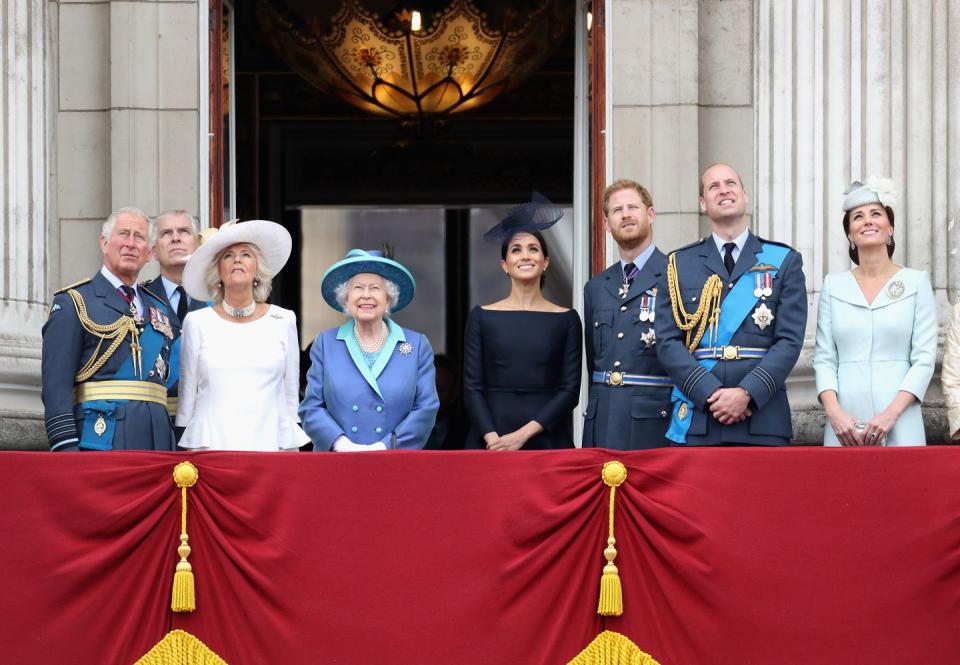
They have remained recognizably themselves—they're unchanging in a world that is full of nothing but change. That's their greatest strength and their downfall at the same time. They're under constant pressure to move with the times, to adapt, to change. With that runs the risk of looking flaky or ridiculous. For the most part, I would say the Queen managed that—it's a razor's edge of getting it just right. I think she did a really good job.
I've been actually taken aback in some ways about how hostile so many people still are to the King and the Queen Consort. My inclination is to give them a fair chance. It's just a human thing to be very quick to judge people in the public eye without ever saying, how would I do if I were held up to that same kind of level of scrutiny? I would be horrified. I can't imagine anything worse than people knowing the contents of personal emails or an argument I had with one of my kids.
There's many amazing things about being a member of the royal family, but largely speaking, it's a pretty thankless and a miserable job. It requires unbelievable amounts of self-discipline, which the Queen had, and not everyone is fortunate enough to have that level of kind of iron will. I think William and Kate have it, but I think it's unfair to expect that everyone coming through the pipeline will have that.
There are many people in this world who are far more wealthy and far more powerful than members of the royal family, but do not have to exist under this light of scrutiny.
What are you looking forward to most about King Charles's coronation, having written this novel? Are you thinking about the hotels on the procession route?
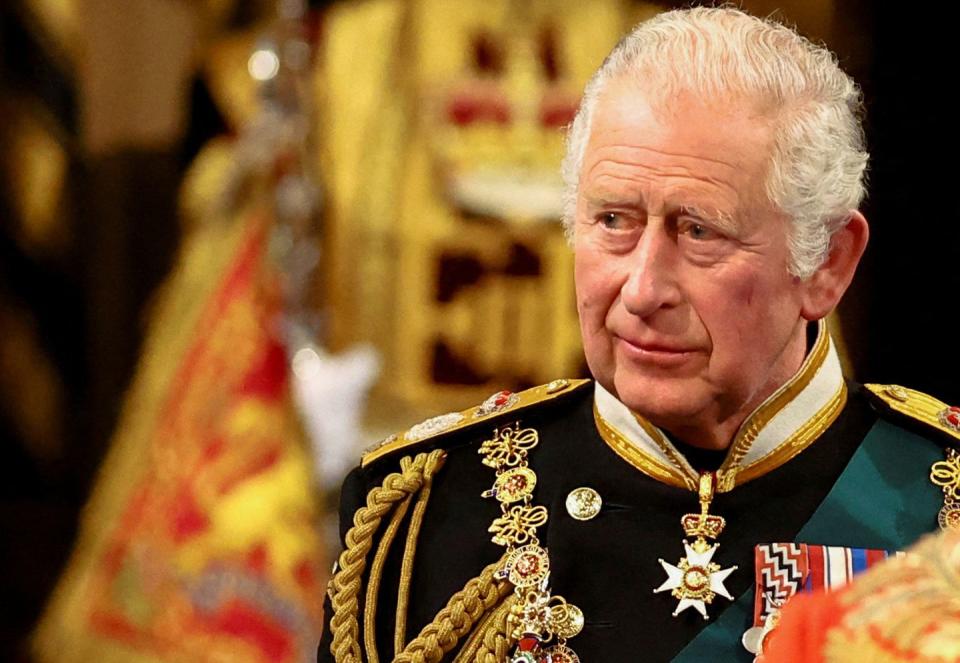
I'm really fascinated by how they will incorporate the historic elements that are largely unchanged. There are six central elements of the coronation—how they will take these elements that are sacred in nature? There's a communion service within the coronation, and that's the moment at which the monarch is anointed. For people of the Anglican faith, that is a profoundly significant moment. Certainly for the King, I think he would regard it as the most important moment of his life. That's how the Queen regarded it; that was the central defining moment of her life.
How are they going to take these very ancient and in some people's view, arcane, moments of ritual and integrate them within what the King has signaled will be a modernized, slimmed down, much more diverse and inclusive ceremony? I suspect they'll pull it off. The British are very good at pulling these things off.
I will be absolutely glued to the television. Sadly my invitation to the coronation has been lost in the mail!
You Might Also Like

